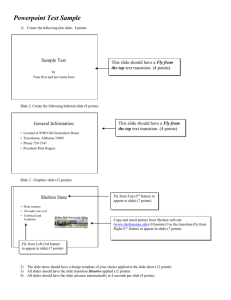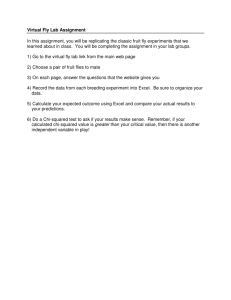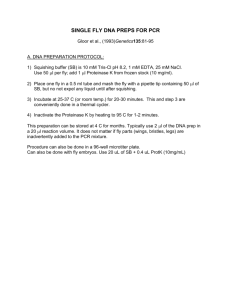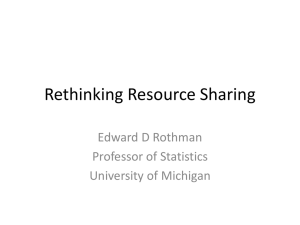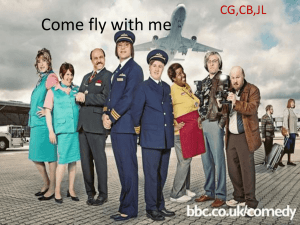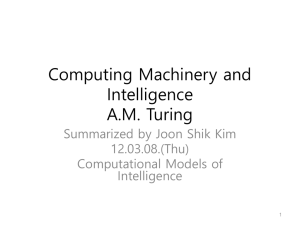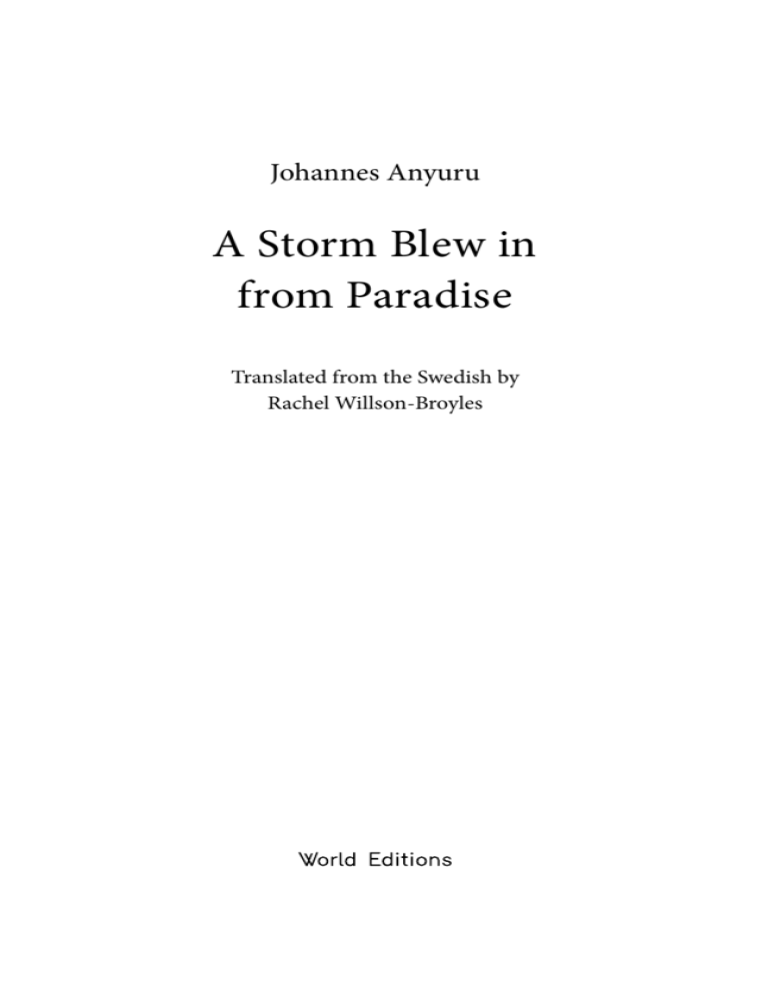
Johannes Anyuru
A Storm Blew in
from Paradise
Translated from the Swedish by
Rachel Willson-Broyles
Published in Great Britain in 2015 by World Editions Ltd., London
www.worldeditions.org
The Walter Benjamin quote on p. 180 is from Illuminations,
by Walter Benjamin, translation by Harry Zohn
and copyright 1968 Harcourt Brace Jovanovich, Inc., New York:
Schocken Books, 1969, pp. 257–8.
The quote from the Quran on p. 249 is in Surah 14:48 from the
translation by Abdullah Yusuf Ali, published by Tahrike Tarsile Qur’an,
Inc., Elmhurst, New York, 22nd US Edition, 2007.
Copyright © Johannes Anyuru, 2012
English translation copyright © Rachel Willson-Broyles
and World Editions, 2015
Cover design & cover credit © Multitude
The moral rights of the author and translator have been asserted in
accordance with the Copyright, Designs and Patents Act 1988
First published as En storm kom från paradiset in Sweden in 2012 by
Norstedts, by agreement with Norstedts Agency, Stockholm
British Library Cataloguing-in-Publication Data
A catalogue record for this book is available on request
from the British Library
isbn 978-94-6238-003-5
Typeset in Minion Pro
The cost of this translation was defrayed by a subsidy from the Swedish
Arts Council, gratefully acknowledged
Distribution Europe (except the Netherlands and Belgium):
Turnaround Publishers Services, London
Distribution the Netherlands and Belgium: Centraal Boekhuis,
Culemborg, the Netherlands
All rights reserved. No part of this publication may be reproduced,
stored in or introduced into a retrieval system, or transmitted, in any
form, or by any means (electronic, mechanical, photocopying, recording
or otherwise) without the prior written permission of the publisher.
Phone: +31 (0)76 523 3533. Email: info@worldeditions.org.
‘Why did you come back?’
P has been sitting with his chin on his chest; he raises his
eyes and looks across the table again. ‘I’ve already told you,’ he
says. The room is windowless, and despite the fact that both
men have unbuttoned several of their shirt buttons, they are
sweating profusely; there are large wet spots on their backs
and under their arms. The interrogator spreads out his fingers
and drums his fingertips against each other. P looks down at
the floor again. The concrete looks rough and desolate, like a
photograph of the moon’s surface.
‘I was promised a job at a company outside Lusaka.’ P
doesn’t understand why they’re holding him here, why they
have brought him here at all. ‘I was going to fly a crop duster.’
‘You were going to fly a crop duster.’ The men are speaking
Swahili with one another. The interrogator looks through the
papers on the table. His body is wiry, his face is fleshy and
his features crude, his moustache is sprinkled with grey, he is
nearly bald. His facial expressions are amused, cruel, sometimes artificially friendly. ‘A Ugandan fighter pilot travels
from Rome to Zambia to fly a crop duster over fruit plantations?’
P wipes the sweat from his brow. They brought him here
straight from the airport, and he hasn’t had anything to eat or
drink all day. He is tired; he has the sense of being caught in a
dream that is far too long, of swimming underwater, of being
outside himself. The walls of the room are blue. Tendrils of
bare cement appear where the paint is flaking. They look like
continents on a map from another time, another world.
13
‘Send me back to Rome if you don’t believe me.’
A guard is standing in the corner of the room to the left,
behind P’s back; his presence makes itself known only by the
scraping of shoes against the floor. The interrogator changes
position, rests his chin in his hand, places an index finger over
his lips in reflection. He refuses to believe that anyone would
return to this devastated continent without aims beyond the
one P has given time and again: that he wanted to fly, that his
only chance to fly was at a small company outside Lusaka in
Zambia that sprays fruit plantations using propeller planes
from colonial times.
P screws up his eyes and feels the exhaustion rising in his
head like a white roar. He feels ill.
‘It’s time you realize you won’t be allowed to return to your
contact in Rome.’
‘My contact?’
The interrogator pounds the table with his hand. ‘Who sent
you to Zambia? Who do you work for?’ The guard behind P
moves; his shoes scrape against the floor. ‘Well. How could
we send you back to Rome? Officially, you already went back
there, from Lusaka, didn’t you? You signed the deportation
order yourself.’ The bald Tanzanian points at a document,
then takes out yet another piece of paper and places it on the
table. ‘Right here, you signed a statement to attest that you
have been sent back to Lusaka, from here.’
P stares straight ahead, trying to think of something to say.
He hasn’t been beaten, but violence is hanging in the air.
‘You ought to be more careful about where you put your
signature. You no longer exist. It’s time you start answering
our questions.’
Many of the papers that have already been placed on the
14
table belong to P: his passport, his plane tickets. The interrogator takes yet another document out of a folder and looks
at it, pretending to be considering something. He places it on
the table and pushes it over to P, who picks it up.
P looks at the Greek letters. His name and rank. The insignia of the Hellenic Air Force: a man with wings, white against
a sky-blue background. His diploma.
‘You were trained at the Hellenic Air Force Academy in
Dhekelia outside of Athens; then you went to Rome, and
from there to Zambia. Why?’
‘I wanted to fly.’ The statement sounds like a lie even to him.
He wants to shout, to stand up and overturn the table, shout
that he just wanted to fly. He feels the letters with his fingertips. He just wanted to fly. Inside him, a scrap of an image flutters by, a memory that feels like it took place in another life:
he’s standing beside a chain-link fence, watching jet airplanes
come sinking out of the sky; it’s his first autumn in Greece,
and the leaves haven’t yet fallen but the crowns of the trees
in the playground have turned a colour like cardboard; he
and the rest of the future flight cadets from the Third World
study Greek on narrow wooden benches, repeating verbs and
nouns all day long, but one afternoon they are picked up by
a bus and driven through the barriers around the air-force
academy and dropped off at that chain-link fence that faces
the airfield, and they stand there and look at the airplanes
that they’re going to learn how to fly, later, after their language course is finished—the sleek murder machines move
across the runway, far away, slow and wobbly like gulls.
‘Do you want a cigarette?’
P shrugs without looking up from the document in his
hands. The interrogator must have given a signal to the guard,
15
because he takes a step forward and holds out a pack of unfiltered cigarettes. P takes one, sticks it in the corner of his
mouth; the guard lights it and then backs into the shadows
again. P puts down his diploma, waits for a question, or for
violence, or for his release, for something; he smokes.
‘What is your opinion of Obote?’
‘Of Obote?’ He lets the smoke curl through his nostrils. ‘I
wish he were president of Uganda. He is one of my people.’
‘Tell me what happened when Obote visited your village in
the spring of ’69.’
‘I was in Greece in ’69.’ P knows what the interrogator is
talking about. John wrote about it in a letter.
‘The spring of 1969.’ The man pronounces the year slowly, syllable by syllable, as though there were a chance that P
might have misunderstood it. ‘In the spring of 1969, Milton
Obote, your president, travelled around and gave speeches in
the countryside. It was a campaign to unite the people after
the Buganda kingdom uprising. You are familiar with this?’
‘I was in Greece.’
‘When he came to your village, he was attacked by a mob
that tore down the podium, destroyed the microphone, and
forced him to flee.’
‘I was in Greece.’
‘But you heard the news from your family, didn’t you? You
were all against Obote.’ The interrogator points at P as he says
this, as though P were the one behind the general disapproval
of Obote’s tendency to favour his own family, his own ethnic
group, from the presidential palace. P snorts, ashes onto the
floor, shakes his head.
‘My life was destroyed by the military coup.’ He waits for a
question that doesn’t come; he tries to remember what he has
16
said and what he hasn’t said, which lies, which omissions, and
which confessions measure out the bounds of this conversation. The three men are silent; only their breathing is audible,
and the dull hum of a ventilation duct, and far off, outside
the room, the occasional sound of footsteps. The interrogator
takes a photo album from a box on the floor. P recognizes it;
like the documents on the table they have taken it from his
luggage.
In 1969 he was in Greece, flying the training planes. In 1967
he was in Greece, studying Greek and watching the training
planes land and take off, and in the evenings came a chill that
he had never experienced in Uganda and that made him sleep
with his olive-green training jacket pulled tighter around his
body, made him shiver, and some days a breeze came from
the sea and brought with it enormous amounts of sand that
blew in over the narrow streets of Dhekelia, sand white as
pearly shards, or white as broken bits of sky, sand that lay
in thick dunes along the edges of sidewalks and the sides of
houses. He went to the sea sometimes, on the weekends, on a
civilian bus line that carried tourists in the summer but was
nearly empty in the fall, winter, and spring. He wandered
alone in the swell with his shoes in his hand and his pants
rolled up and felt how something from his childhood, some
vague thing, was swallowed by darkness, and maybe by forgiveness. He sometimes thought, then, by the sea, that the
people who existed at that time would one day disappear, become limestone on the bottom of another sea.
The interrogator takes a photograph out of one of the plastic sleeves and pushes it across the table. A young African
man in a pilot uniform stands on a T-37, supported by the
large, grey tail fin, almost twice as tall as a person.
17
‘This is you.’
‘No,’ he says quickly, without knowing why he is lying.
‘It’s not you?’
The photo is grainy and the face in the picture is shadowed
by the pilot’s helmet, blurry. It could be someone else. The situation between Tanzania and Uganda is very tense. Uganda’s
military is shooting grenades across the border. Amin claims
that Ugandan guerrilla soldiers who want to overthrow his
regime have camps in Tanzania.
‘It’s someone else.’ He shouldn’t have lied, but he did and
now he has to stick to his lie. He bends down and stubs out
his cigarette under his shoe. There are already two butts on
the floor from cigarettes he smoked earlier. How long has he
been sitting here? ‘It’s one of my classmates.’
‘You persist in lying.’ The interrogator shakes his head,
makes a disappointed face, folds his hands over his stomach,
and leans back in his chair. ‘It’s not important. We’ll start over
from the beginning. The man in the photograph is you. You
belonged to the second generation of Ugandan fighter pilots.
You were sent to the Hellenic Air Force Academy in Dhekelia outside of Athens, which has produced fighter pilots for a
number of African countries since the early sixties.’
The first time they went through this, P refused to confirm
any of what the Tanzanians said, but the irrational loyalty he
felt toward the two states that have now completely betrayed
him disappeared as his exhaustion grew. He closes his eyes
and nods slowly; yes, he was sent to Greece to be trained as
a fighter pilot and an officer in the Ugandan air force. He sits
with his chin lowered, his eyes closed.
He remembers the increasingly chilly autumn days and the
shouts in Arabic and French and the crowds in the corridors
18
when they all rushed out to the yard, all at the same time to
shove each other and brag about the military education in
their countries and the planes they’d already flown during the
trials. He remembers the days. He particularly remembers
the day when they took the bus to the airfield and stood staring through the fence, how their eyes widened when the afterburners on a T-37 lit and comet tails of welding-flame blue
slowly grew out of the jet exhaust, and how the plane jerked
and hurled away and up, and that in that moment it felt like it
was possible to start over, to leave your past behind, to escape.
As though history didn’t exist.
Uganda had recently become independent from British
rule, and they had started to build up the nation’s air force by
buying MiG-21s from Israel. A first generation of Ugandan
pilots had been trained to fly these by Israeli security advis­
ors, but while the Israelis continued to train Ugandan pilots,
they began to send small groups of young men to the Hellenic Air Force Academy in Greece. The idea was that they
would become familiar with American and French fighter
planes and, above all, become officers drilled in the military
lifestyle, gentlemen, leaders. While the Ugandan pilots who
were educated in their native country only trained for a little
more than six months, those who went to Greece would study
at the air force academy for three years in order to become
the corps and spearhead of the new air force.
They slept in bunk beds and kept their few belongings in
grey metal lockers; they were the most promising members
of their generation, their country’s future gods of the sky. As
they walked from the student quarters to the language-school
building, cawing birds ate from garbage cans. P was in a class
that was mostly made up of Libyans, Egyptians, and Tuni19
sians, but also students from the Ivory Coast and a young
man from Chad.
He received letters from John, his eldest brother; he read
them sitting on his bed. He longed for the language course to
be over so he could begin his military training and then learn
to fly. He jogged in the afternoons, felt his heart beating and
his lungs expanding, contracting, expanding; he went to the
sea, he bent down and washed his face in the water that tasted
of salt, not sweet like the water on the shores of Lake Victoria.
Not like home.
On the day when they stood at the fence with their eyes
open so wide that the whole sky would fit in them, the sky
that would soon be theirs, the sound of the airplanes’ motors
were like thunder and when the planes descended they had
rated the landings, given their future colleagues two points
out of ten, or three points, or sometimes one point, and of
course one of them would yell zero then, to be the worst: in
Greek, zero. They had boxed with each other and laughed.
That was in the beginning. When he was a child he had wanted to be a bird.
‘What did you say?’
The interrogator said something that P didn’t hear. P is sitting with his head in his hand, his elbow on the table. His
eyes are still closed. Inside him, the image and the sound of
hundreds of hovering birds.
‘I said that I’m quoting one of the air force academy’s own
documents.’ The interrogator has another piece of paper in
his hand; he folds it, unfolds it, reads: ‘“Ever since airplanes
were first used in military operations in 1912, the Air Force
has protected the skies of our country against every threat,
and it is with deep respect that we turn to the victims and the
20

